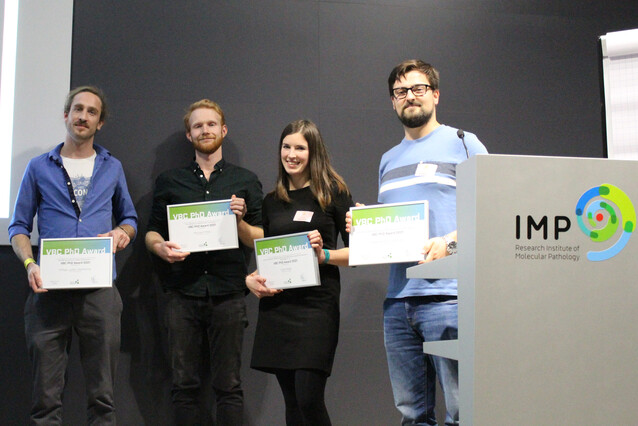Vienna BioCenter PhD Awards for two IMP graduates

Lisa Haas and Philipp Dexheimer, IMP alumni of the Vienna BioCenter PhD Program, were recognised for their outstanding doctoral research during this year’s Vienna BioCenter PhD Student Symposium.
PhD students at the Vienna BioCenter form a tight-knit community and organise the Vienna BioCenter PhD Symposium every year, which gathers molecular life scientists from across the globe to share the latest developments in the field. During this event, the best theses from the program defended that year are recognised with the Vienna BioCenter PhD Award.
Today, Lisa Haas and Philipp Dexheimer each won an award for their exceptional achievements, alongside with two students from the Institute of Molecular Biotechnology of the Austrian Academy of Sciences (IMBA).
Lisa Haas conducted her PhD in the lab of Anna Obenauf. She investigated the influence of different forms of skin cancer therapy on tumour cell composition and on subsequent therapies. She found that administering targeted therapy, one of the pillars of cancer treatment, can alter the cell composition of a melanoma and compromise the effectiveness of immunotherapies in mice. This phenomenon, called cross-resistance, is also observed in humans, and highlights the need to understand how therapies shape tumours. Lisa’s research was published in the journal Nature Cancer. She is now an editor in the scientific publishing industry.
Philipp Dexheimer was a PhD student in the lab of Luisa Cochella. Philipp studied microRNAs, tiny RNA-molecules that can silence genes with complementary sequences, acting as post-transcriptional repressors of gene expression. Using novel molecular tools, Philipp depleted embryos of the nematode worm C. elegans of any miRNAs before reintroducing specific ones individually. Philipp found that two certain miRNAs restored normal development. The research does not only demonstrate the importance of miRNAs in development, it also provides a blueprint for further studies of small RNAs and their role for embryogenesis and gene regulation. Philipp’s findings were published in the journal Current Biology; he remains a member of the IMP, contributing his worm expertise to the Clausen lab as a senior research assistant.
The Vienna BioCenter PhD Program is a selective doctoral school of the University of Vienna and the Medical University of Vienna, in collaboration with the IMP and the other research institutes of the Vienna BioCenter. Students in the program develop and lead their research project under the supervision of top scientists, with access to state-of-the-art facilities and technologies.
Further reading